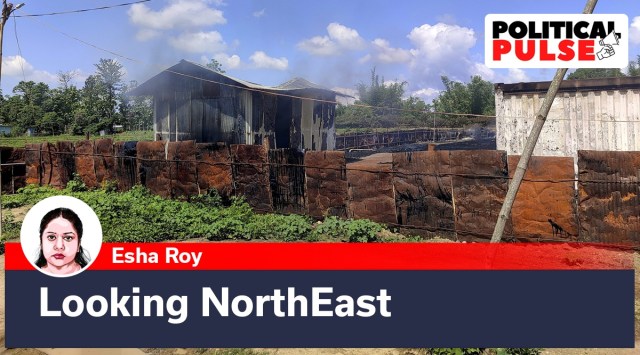The Meira Paibis of Manipur: Meitei ‘guardians’ taking on security forces
Every colony in Imphal has a Meira Paibi, so does every village. And as violence returns to Manipur, the women who have been a part of its every agitation, big and small, are back on the frontlines
 Burnt remains of the godown of Manipur PHED Minister L Sushildro Meitei after it was set ablaze by a mob during the continuing ethnic unrest between Kuki and Meitei communities, at Chingarel in Imphal East district, June 24, 2023. (PTI)
Burnt remains of the godown of Manipur PHED Minister L Sushildro Meitei after it was set ablaze by a mob during the continuing ethnic unrest between Kuki and Meitei communities, at Chingarel in Imphal East district, June 24, 2023. (PTI) The insurgency in Manipur is one of the oldest in the country, with the first Imphal Valley-based Meitei group and the insurgency movement’s mother body, United National Liberation Front (UNLF), founded in 1964. Two decades later, in the early 1980s, the Meitei insurgency hit its peak, with a proliferation of militant groups. It was then that the Union government sent in the Army and paramilitary troops, and the Meira Paibis or the “women torch bearers” of Manipur first came head to head with the security forces.
As the security forces launched combing operations in Imphal Valley, raiding village after village in search of insurgents, the Meira Paibis and their Emas (mothers) stood their ground to protect “Naharols”, that in the Meitei tongue means “youth” but at the time was a commonly used moniker for the cadre of insurgent groups.
Held a meeting with a group of women leaders (Meira Paibi) in Manipur. Reiterated the significance of the role of women in the society of Manipur. Together, we are committed to ensuring peace and prosperity in the state. pic.twitter.com/z2Qj7adyAz
— Amit Shah (@AmitShah) May 30, 2023
Forty years later, the Meira Paibis seem to have slipped back into the same role. On Monday, the Army’s Spear Corps tweeted a video showing the Meira Paibis taking to the roads to block the movement of security forces and in one instance accompanying, in vehicles, youth who were allegedly armed. While conspicuously absent in the first phase of the violence in Manipur that started on May 3, the Meira Paibis are back in force since direct clashes started between armed men of the Kuki-Zomi tribes and the Meiteis.
While Manipuri society is not matrilineal, women have always held a central place in Meitei society, prompting author Manjushree Chaki Sircar to call them — in her book “Feminism in a traditional society: Women of the Manipur valley” — some of the first feminists in the country. From the times of the Manipuri kings and the kingdom of Kangleipak, unlike neighbouring societies, women have enjoyed property rights.
There is also the oft-quoted role of the Meira Paibis in British India when two major movements or “Nupi Lal (women’s war)” took place. The first was in 1904 when Col Maxwell attempted to reintroduce the Lallup system by which men were required to perform 10 days of free labour every 30 days. The order was subsequently retracted. The second Nupi Lal took place in 1939, with Meira Paibis taking to the streets to protest against the Maharaja’s economic policies, price rise, and the export of rice from Manipur when there was paucity in the kingdom. The Maharaja, like the British earlier, relented.
In their paper on Meira Paibis published in the Asian Review of Social Sciences in 2020, Aruna Chanu Oinam and Purnima Thoidingjam wrote, “Every woman in Manipur becomes Meira Paibi during a difficult situation which directly affects the communities.’’ In independent India, every movement in Manipur state on every issue of vital importance was led by Meira Paibis, whether it was for statehood (Manipur became a state in 1972), the inclusion of Manipur in the Eighth Schedule, or the famous agitation that led to the ban on alcohol.
Every Leikai (colony) in Imphal City has a group of Meira Paibis. As does every Meitei village. The eldest of each group becomes its leader. Though the Meira Paibis represent all of Meitei society, only married women make up their ranks. Academics say only women “past their biological cycle” are meant to be inducted into the groups “as a measure of protection against sexual assault”. And while today women of all ages are Meira Paibis, the leadership positions continue to be held by the eldest among the women. And despite some amount of streamlining and institutionalisation over the years, the body remains largely amorphous.
In more recent decades, it is the group’s stand against the controversial Armed Forces Special Powers Act (AFSPA) that has given it a legendary status. They were also the backbone of Irom Sharmila’s 16-year hunger strike against AFSPA. The Meira Paibis’ agitation against AFSPA was accompanied by an equally fierce watch on human rights violations in the state. In 2004, following the alleged rape and murder of Thangjam Manorama Devi, a suspected insurgent, around 30 Meira Paibi women marched naked in Imphal city with a banner that read: “Indian Army Rape Us”.
But even as the Meira Paibis have assumed responsibility for the state’s most pressing issues, they simultaneously have become arbitrators of more personal, smaller ones. They hear and resolve marital disputes and property disputes involving women, and have over time become the Meitei society’s “moral conscience”. This new role increased when the conflict in Manipur waned. Several years ago, the Meira Paibis cracked down on the youth of Imphal Valley for “morally straying”. Groups of Meira Paibis started paying surprise visits to Imphal Valley’s ubiquitous rice hotels, many of which would have secluded cabins at the back where young men and women could meet privately. They cracked down on the use of cellphones among the youth as well.
Despite the Meira Paibis’ moral vigilantism, their main focus remained the larger movements confronting the Meitei society. From 2012 to 2019, when the Inner Line Permit was finally imposed in Manipur, it was the Meira Paibis who remained constant and on the frontlines of the sometimes violent agitation that often led to a face-off between agitators and the Manipur Police, and subsequently curfews.
Meira Paibis vs Meira Paibis
But the Meira Paibis are not a homogeneous entity and who the groups owe their allegiance to often differs. After the BJP took the reins of the state in 2017, the economic bandhs and blockades that plagued Manipur and brought life to a halt frequently came to an end. Months after the new dispensation came to power, a curious incident unfolded in Imphal Valley. On June 10, three months after N Biren Singh assumed office as chief minister, the Meira Paibis of Thangmeiband Colony in the capital city called a “love bandh” after a local woman alleged that 38-year-old Heikham Dingo Singh, a first-time MLA from the BJP, was refusing to marry her after a seven-year relationship.
The angered Meira Paibis of Thangmeiband stormed Sekmai town where Singh hails from, with the woman in tow, and stood in front of the gates of the MLA’s home, demanding that he accept her. But the Meira Paibis were met with an equally powerful force to be reckoned with and the only one that could stop them in their tracks — the Meira Paibis of Sekmai.



- 01
- 02
- 03
- 04
- 05




























